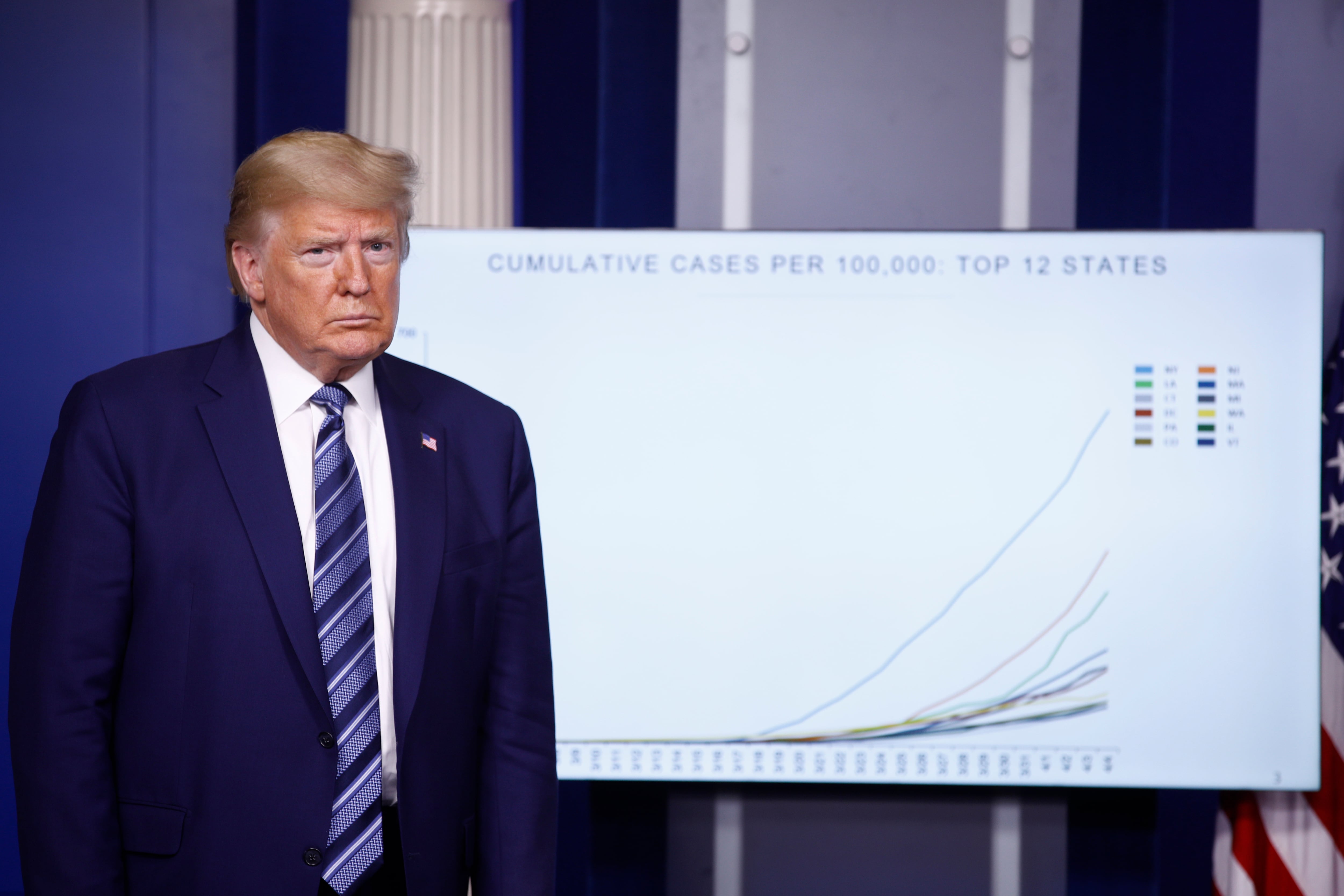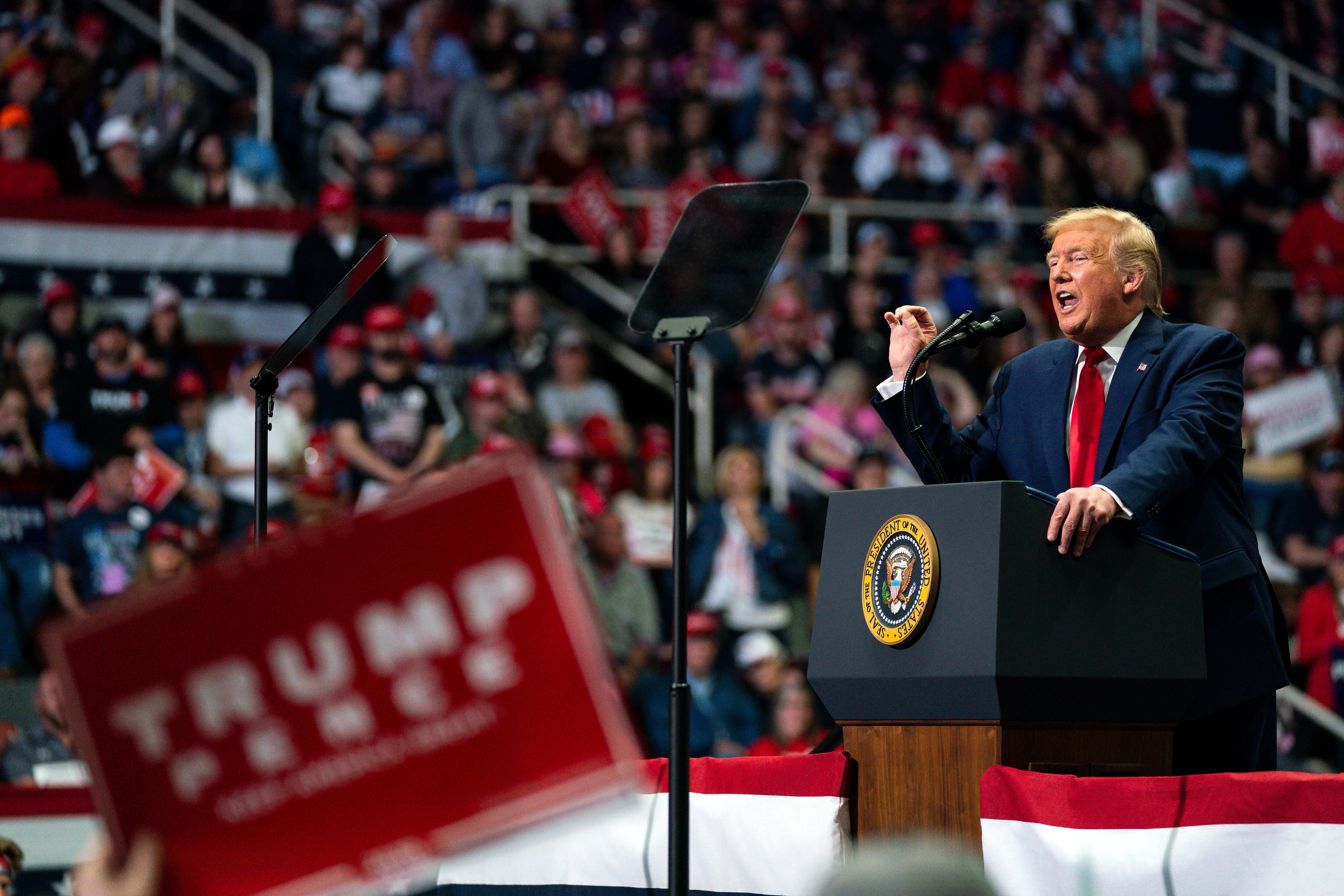News Analysis
Coronavirus is inundating city hospitals and overwhelming suburban medical centers. The week ahead promises to bring “our Pearl Harbor, our 9/11 moment,” the Surgeon General has warned. And it’s resurrected a daily American ritual not seen since the 1970s: leading newscasts with a rolling count of the U.S. dead.
More than 10,000 people in the U.S. have died of COVID-19 as of Monday afternoon — famous neurosurgeons, disability rights advocates, rock stars, couples. There are more than 340,000 confirmed cases, more than the next two countries, Spain and Italy, combined.
As freezer trucks arrived to serve as overflow morgues in the cities and suburbs, as a convention center and world-famous tennis stadium were converted into makeshift hospitals, as floating Navy hospitals once sent to devastated developing nations like East Timor and Haiti pulled into two of the economic capitals of the world, President Trump last week finally publicly acknowledged a projection he had long resisted: that anywhere from 100,000 to 250,000 Americans are likely to die of the disease.
That the acknowledgment came from a president who has repeatedly downplayed and dismissed the threat of the disease — waiting weeks to react, then mischaracterizing the belated responses, and at one point appearing to deride the disease as a “hoax” — amplified the magnitude of the moment.
Fewer than half as many Americans were killed in action in Vietnam as are expected to die from coronavirus. The toll then was enough to unleash a political, societal and racial cataclysm that tore rifts across U.S. communities that still bear the scars today. And the mass upheaval forced President Lyndon Johson, a legendary political strategist who dedicated decades of his life to obtaining the highest rungs of power, to give up hope of re-election and to withdraw from politics.
Yet this time, under President Trump, in spite of a far larger expected death toll and the drumbeat of disclosures that the president had been warned repeatedly about the coming catastrophe, there has not yet been a similar backlash.

“What was it that was causing people to have the reaction that they had to Lyndon Johnson? And why is it they don’t seem to be having that against Trump, or at least not yet?” said Barbara Ann Perry, presidential studies director at the University of Virginia’s Miller Center.
There are some obvious answers. Trump, through Fox News and much of the conservative media’s nervous system, enjoys a platform that LBJ could never have dreamed of. It is a rear guard that minimizes or glosses over the president’s most outrageous statements while constantly attacking his critics.
“This is a president who commands the airwaves,” said Allan Lichtman, distinguished professor of history at American University, who developed a historically based prediction system that’s been correct in about every presidential general election since 1984. “All people are hearing is Donald Trump patting himself on the back and explaining away any failures, and that gets echoed of course in the right-wing media.”

The coronavirus crisis is still in its early stages. Johnson, sworn into office after the assassination of President John Kennedy, arrived amid a fleeting moment of national unity, enjoying a soaring approval rating near 80%. However, as he escalated the Vietnam War and as the death toll climbed through the next five years to 35,000 under his watch those ratings steadily flagged, dropping into the 30s amid the upheaval of 1967 and 1968.
The coronavirus, by contrast, has surged across the U.S. over the course of just two months. Health experts predict — or hope — that with proper mitigation efforts, the crisis may start to subside by August or September, although such predictions are looking rosier by the day. That may well blunt any political impact for the president, especially if the economy — hammered by the near-total shutdown in activity — starts to recover.
“If the American public is still locked-in in August, and the death toll is high, they may make the judgment that President Trump's actions were not big enough, strong enough, early enough to protect us, and we need a change,” said Mark Rom, associate professor at the McCourt School of Public Policy at Georgetown University. “However, if by August the death toll is dropping, and the economy is coming back, the public may reasonably conclude that President Trump's actions were decisive enough to save us from additional damage.”
As news accounts from the front revealed just how badly the Vietnam War was going, and as more American soldiers returned home horribly maimed or in body bags — or not at all — reporters, politicians and voters began openly questioning the rosy narratives being painted by the president and his military leaders. Later, leaks like the Pentagon Papers would reveal just how aware Johnson was of the deteriorating situation in Vietnam, even as he proclaimed that victory was just around the corner.
Yet Trump, in spite of his well-documented falsehoods and mischaracterizations, in spite of being briefed by the Army in early February about coronavirus’s potential toll, has so far avoided the bipartisan perception of a “credibility gap” that bedeviled Johnson. The president’s near-daily press briefings have somehow managed to cleave real life into a split-screen: Trump declaring that enough ventilators are available and that large gatherings may soon resume as medical experts standing next to him then gravely warn of catastrophe.
“We’ve never had a president who prevaricated so prodigiously. Even Nixon didn’t lie all the time. He lied selectively,” Perry, of the Miller Center, said. “Will that start to backfire on him?”
There are ominous signs for the president and his political supporters. Americans tend to rally around the president amid a national crisis: President George W. Bush saw a 30-point jump in his approval ratings post-9/11. At the start of the Gulf War, President George H.W. Bush’s favorability similarly catapulted from the mid-50s to the low-80s. Even President Jimmy Carter’s anemic approval rating, stuck in the 30s, skyrocketed to the 50s at the outset of the Iran hostage crisis.
Trump has seen no such jump. Even as most Americans say they approve of how states’ governors similar views of Trump lag by double-digits. In the days after declaring a national emergency last month, Trump’s approval rating overall eked up just 4 points before collapsing again.
“The polls are between 48-50% — that’s terrible for a president in these early stages of a crisis,” Lichtman said. “There’s a 30-point gap between approval ratings of Trump on handling this and the approval ratings of the governors — I’ve never seen anything like that. And yet all Trump can do is pat himself on the back and blame his problems on someone else.”
Trump has held onto fervent support from about 35% of the U.S. electorate. About 86% of Republicans approve of the job he’s doing. Yet the impacts of the coronavirus — deaths, overrun emergency rooms, overburdened ambulances — are only just starting to be felt in traditional Republican strongholds and bases of Trump’s support.

As more white Americans in the middle of the country fall ill or die, a key question becomes whether that begins to erode what has so far proved a near-indestructible base of support. Even as Trump seeks to claim that avoiding 2.2 million deaths would be a “victory,” that may ring hollow as the impact hits close to home.
“In that base group, if people are dying in their families, what will be the response?” Perry asked. “In 1968, you have the Tet Offensive happening in January 1968: we win that offensive action, but it doesn’t feel like it’s a win and you begin to have media like Walter Cronkite saying, ‘What are we there for?’”
Similarly sharp questions about the president’s choices, Perry and other scholars say, may soon await Trump.
“For me, the thing I wonder on a personal level is when those in rural areas, who tend to be more Republican, more conservative, more elderly, if they start seeing their loved ones die, will that lead them to question the president's decisiveness?” Rom said.
“This is not an invasion we asked for, this is a disease that came without invitation. So when you lose someone in your family, you say, ‘That's tragic and it's understandable,’ or ‘It's tragic and I blame the government.’ Which one is that going to be? The longer this drags on, the more the answer's going to be, ‘I blame the government.’”



